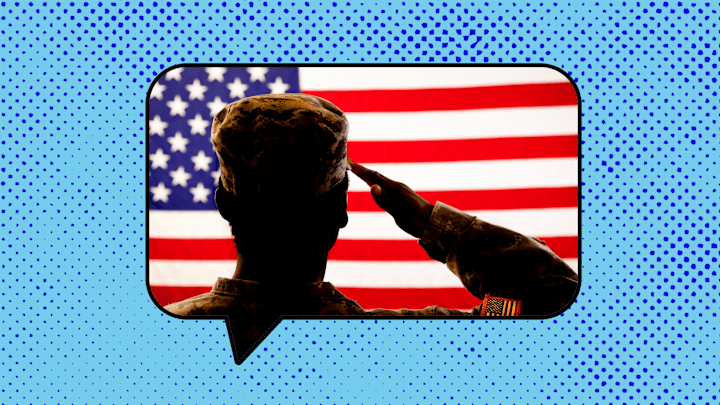War breeds destruction, death, and misery. It also breeds slang, probably for two reasons.
One, the close quarters of those serving together in war is a perfect Petri dish for jargon. Slang blossoms with an in-group and is often incomprehensible to out-groups. You can’t be more of a tight-knit in-group than soldiers or sailors serving together.
Two, all that destruction and misery are traumatic, and death itself is one of our most taboo subjects. So war slang is frequently served with a side of euphemism.
Please enjoy this smattering of military slang—maybe the only creative output of the horror that is war.
Fubar
Anything fubar is “fouled up beyond all recognition,” and if that sounds like a euphemism for the f-word, you’re often correct. The first known use, from Yank magazine in 1944, uses the more printable version, describing “The FUBAR Squadron ... FUBAR? It means ‘Fouled Up Beyond All Recognition’.” Aside from referring to anything completely screwed up, the term can also mean “heavily intoxicated.”
Snafu
Also from the acronym department, this word for a major-league whoopsie stands for “situation normal: all fucked up.” The Oxford English Dictionary (OED) defines it as “an expression conveying the common soldier's laconic acceptance of the disorder of war and the ineptitude of his or her superiors.” As for why the military uses so many acronyms: It’s because of “the need for expedient, clear communication” and “to make big concepts easy to communicate,” in the words of Military.com.
Army Strawberries

Some military terms comment on the little things in war rather than the omnipresent dangers. One such term is army strawberries, which refers to something generally undesirable but not deadly: prunes. Green’s Dictionary of Slang records this term in use since at least 1916, and a 1941 article in the San Francisco Chronicle shows it had some staying power: “The draftees assigned to Camp Claiborne, in Louisiana, got out a glossary of slang terms to describe everyday things in army life [...] The Louisiana lads call prunes ‘army strawberries’ [...].”
Gremlin
The OED defines this word, which comes from R.A.F. (Royal Air Force) slang, as “A lowly or despised person; a menial, a dogsbody, a wretch.” That sense can be seen in a 1929 issue of Aeroplane: “There is a class abhorred, Loathed by all the high and mighty, Slaves who work and get but little, Little thanks for all their labour; Yet they are both skilled and many, Many men with many talents ... They are but a herd of gremlins, Gremlins who do all the flying, Gremlins who do much instructing, Work shunned by the Wing Commanders.” From there, as the OED puts it, the term spread to mean “a mischievous sprite imagined as the cause of mishaps to aircraft” and later still as “an unexplained problem or fault.” So if something goes wrong and you don’t know who to blame, you can always blame a gremlin. The term transcended military slang thanks to the 1943 book The Gremlins by Roald Dahl and later the 1984 film Gremlins.
Organize
This sense of organize isn’t so much about project management as it is blatant theft. The term popped up in World War II, and the first known use is from a 1941 issue of New Statesman, which provides a definition and some context: “Organise, to acquire illicitly. (A new R.A.F. equivalent for the last-war word ‘win’, meaning to ‘scrounge’).” In Henriette Roosenburg’s 1957 memoir The Walls Came Tumbling Down, she describes a sad tale of breakfast meat: “Those Frenchwomen … were busy organizing some sausages from a reluctant butcher.”
Shower
The OED defines this British sense of shower, which was originally military slang before spreading to broader contexts, as “A worthless or contemptible group or crowd of people.” The first known use is from a 1936 issue of the Journal of Education, describing, in impolite terms, “a shower of half-sexed, unlicked, undisciplined, wilting pansies.” Shower can also apply to a single jerk, as defined by the OED: “(In the Army.) A detachment or individual whose ways are slack and whose turn-out is slovenly. (In the R.A.F.) ‘What a shower’ is the derisive remark hurled at someone who has just made a blunder.”
REMF and Fobbit
Another acronym, this time from Vietnam, describes those soldiers who offer support but aren’t fighting on the front lines: REMF stands for “rear-echelon motherfucker.” Naturally, the non-remfs resent the remfs, as demonstrated in the first known use of the term in a 1971 Newsweek article: “‘Those REMF’s don’t even know what Vietnam is all about,’ sneered one grunt.” A similar term was coined in the Iraq war: fobbit, a play on hobbit, for someone stationed at a forward operating base (or FOB) and therefore out of danger.
Flak

This word for a barrage of criticism originally referred to a literal barrage of anti-aircraft fire or an anti-aircraft gun. The term is believed to be an abbreviated form of the German word Fliegerabwehrkanone, which means roughly “pilot warding-off cannon” and has been around since around the late 1930s; a 1940 issue of the Times Weekly described “Heavy and accurate anti-aircraft fire from the flak ships.” By the 1960s, the term had spread from deadly weapons to hurtful words. A 1968 issue of The New York Times mentioned the less-dangerous sort of flak: “In spite of the current flak between Mayor Lindsay and … the … administrator of Boston and New Haven … the potential for the city is unlimited.”
Flak-happy and Shellshock
Speaking of flak: It spawned flak-happy, meaning “mentally affected by flak,” according to the OED. Soldiers in World War I would have called that mental state “shellshock,” which George Carlin would later point out is more visceral than the phrase we use for the same phenomenon today: post-traumatic stress disorder.
Read More Articles About Slang:
